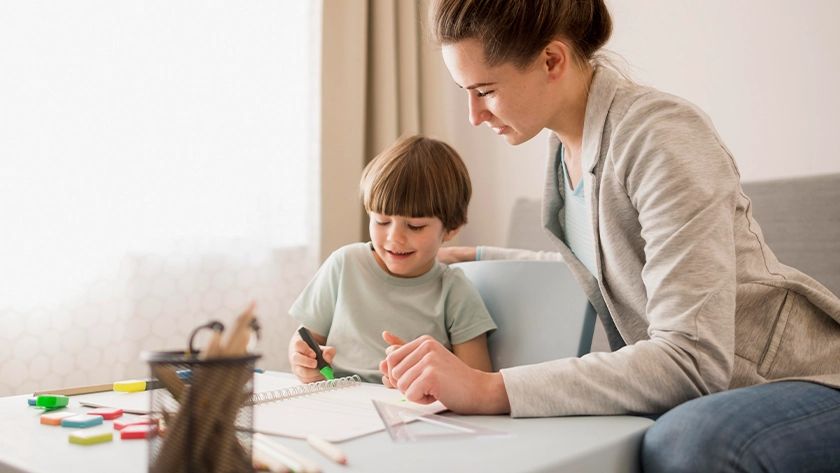
Worried About Your Child’s Physics and Maths Grades? Find the Right Tutor Today!
As a parent, ensuring your child succeeds in school is a top priority. But when

Many don’t know the difference between a tutor and a teacher, which means that many are missing their opportunity to aid their child in improving academically, or simply achieving to their fullest potential.
The role of a teacher depends on the school’s schedule, the classroom sizing, and even the obedience of the children in the sense of timings. Sometimes, though, this can limit the time spent with each student, especially as the average class size in the UK is approximately 20-30 pupils. Also, the teacher must stick to the national curriculum provided, if they teach at a public school. This means that they only have a set amount of time or lessons to explain one subject before moving to the next, often without review further in the schoolyear, meaning students are neglected to do this themselves, which leads to a lack of motivation.
The role of a tutor differs from that of a teacher because they have more time and leverage with one individual student to ensure a personified experience in which will focus on certain topics and subjects the student might struggle with. Essentially, you may get tutors that specify in different topics areas, coming either from online practices, or in-person ones. There’s a variety of different tutors out there of many different ages with different teaching styles, so it’s best to evaluate which might work best for the student before progressing.
The term “Tutorship” refers to a private class hosted mainly for one to five students at a time. Oftentimes, the aim is to regulate grades, build confidence in class, or even just to invest in new skills outside of school. For example, you might have hired a professional to help your child learn a musical instrument: this counts as tutoring because it’s a one-to-one session with your child helping them to learn.
It’s very common, due to the way the curriculum is set, for your child to be struggling with the pace in which the content is provided, and in turn miss significant knowledge or learning strategies. This happens because there is a set number of lessons teachers have on one part of the curriculum, before shifting focus to something else. To add to this, a student may not be taught the topic in a way that is suitable or legible for their learning. This doesn’t mean that they can’t be academically inclined, just that they learn slightly differently to the way the other students do, which mean they may require tutoring.


Personalized tutoring to help students excel—book a free consultation now!.
One thing people like to know is whether a tutor is better than a teacher. There is never any concludable answers from these questions because each tutor and each teacher is different. Tutors and teachers contribute in completely separate ways to a child’s learning and cannot be compared on that alone.
Teachers contribute to a student’s learning by teaching them the fundamentals of the subject they are learning. They will educate them in line with the syllabus the national government’s Department for Education selects. Teachers produce content that follow the syllabus to keep up to standard with what the government would like children to have knowledge on, dealing with around 20-30 children on the subject at once.
Tutors contribute to a student’s learning by advancing on skills and knowledge they already have on the subject, or introducing topics they may have missed due to personal problems. Tutors are great at introducing subject topics to confused students in a way that benefits their personal learning style. Whilst teachers have to teach at a pace and way that benefits most students at the same time, tutors can find a balance with a student in a private setting to help teach in ways the student benefits from most.
Personalized tutoring to help students excel—book a free consultation now!.
In the community of tutoring, you’re likely to find a lot of different sorts of tutors. Some may be students themselves, with substantial knowledge of the topic at hand and will know how to properly delve into the content. Also, student tutors are simpler if you’re prioritising your funds, since they’re likely to charge less as they’re not professionals. However, this might be a bad choice for your child if in the case of they don’t understand the content because of the teaching style, as it’s probable a student tutor was educated the same way your child was, which will ultimately be no help.
Adult tutors, on the other hand, tend to be retired teachers or educators who might have adjusted for this and have overcome it by teaching the subject matter multiple different ways. However, as mentioned previously, these are going to be more costly than student tutors, starting from around £40 an hour in the UK, depending on location.

Some schools will implement tutoring for students who are really struggling, through involvement with their teacher or intervention classes. While these may be useful for some students and could work as a temporary fix, they aren’t guaranteed the most optimal or highest quality help with their studies like they would be with a private tutor, especially if the pupil is repeatedly falling behind.
However, if you’re busy and can’t afford a private tutor, school tutors may be perfect for your child. These types of tutors are still employed by schools, meaning they have credible expertise.
Private tutors are, regularly, the more effective option, long-term. Your child will be in the care of someone who’ll have professional experience with the subject or multitudes of subjects, explaining the content in varied ways to help it resonate with the student. Private tutoring can take place anywhere: from your home to the tutors, public spaces like cafes or libraries, or with an increase in technology you can now find tutors that work completely online, depending on preference.
While school tutors may be less expensive than private tutors, your child will have the opportunity to learn from someone who specialises in that subject, who works within your schedule and can teach your child in a less environmentally exhausting place, at a pace they can relate to. Private tutors will take their time, as they are moving to the speed of the child’s learning, not the pace of a school curriculum.
Personalized tutoring to help students excel—book a free consultation now!.
Aspect of Teaching | Tutor Approach | Teachers Approach |
Lesson Planning | Tailor lesson plans to suit the needs of an individual or small group of pupils. | Manage a classroom of around 25–30 pupils. |
Learning Approach | Primarily aim to help pupils reach their full potential by individualising academic content. | Adopt a holistic approach that meets the needs of all learners based on the National Curriculum or school standards. |
Subject Specialisation | May focus on specific subjects (e.g. GCSE Maths, English, or 11+ exam prep) or a particular age range. | Specialise in subjects aligned with Key Stages (e.g. a secondary school teacher may teach Science across KS3 and KS4). |
Qualifications | No formal teaching qualification is required, though many tutors are graduates or retired teachers. | Must hold a degree and obtain Qualified Teacher Status (QTS) to work in state schools. |
Employment Type | Usually self-employed or work through tutoring agencies; paid hourly or per session. | Employed by schools (state or independent) with a fixed salary. |
Work Hours | Often teach after school hours, weekends, or during holidays; lessons usually last 1 hour. | Work full-time (around 7–8 hours per day), plus planning, marking, and parents’ evenings. |
Teaching Environment | Teach in pupils’ homes, libraries, or online (increasingly popular post-COVID). | Teach in classrooms; some remote teaching took place during the pandemic. |
Assessment and Feedback | Give immediate, tailored feedback; progress is measured individually. | Assess using national exams (e.g. SATs, GCSEs, A-levels), coursework, and school-based assessments. |
Curriculum Responsibility | Follow the pupil’s school curriculum, exam board requirements, or provide enrichment/support. | Deliver the National Curriculum (England, Wales), Curriculum for Excellence (Scotland), or Northern Ireland Curriculum. |
Relationship with Pupils | Build close one-to-one relationships; often act as academic mentors. | Develop relationships across the whole class, balancing different needs and learning abilities. |
Accountability | Primarily accountable to parents and pupils, with progress measured informally or by exam results. | Accountable to school leadership, Ofsted, governors, and national standards. |
Professional Development | Optional; some tutors choose CPD courses or specialist training. | Required to complete CPD regularly and attend professional training as part of the role. |
Scope of Influence | Influence limited to individual pupils or small groups. | Influence entire classes, year groups, and contribute to wider school culture. |
Use of Technology | Make use of online platforms (e.g. Zoom, Teams, or tutoring apps) and digital resources. | Use classroom technology (interactive whiteboards, VLEs, assessment software) to deliver lessons. |
Cost to Families | Paid for privately, often £20–£50 per hour depending on subject and level. | Covered through state funding (for maintained schools) or tuition fees (for independent schools). |
Don’t let physics and maths struggles hold your child back—our expert tutors specialise in maths tutoring and physics tutoring to help them succeed. At Headway Tutor, we make learning easy, engaging, and effective.
📞 Spots are filling up fast—contact us today to schedule a free consultation and help your child reach their full potential!

As a parent, ensuring your child succeeds in school is a top priority. But when

In the realm of educational assessment and cognitive testing, two terms that often come up

The role of tutors has become increasingly crucial in supporting a child’s academic journey. While
| Cookie | Duration | Description |
|---|---|---|
| cookielawinfo-checkbox-analytics | 11 months | This cookie is set by GDPR Cookie Consent plugin. The cookie is used to store the user consent for the cookies in the category "Analytics". |
| cookielawinfo-checkbox-functional | 11 months | The cookie is set by GDPR cookie consent to record the user consent for the cookies in the category "Functional". |
| cookielawinfo-checkbox-necessary | 11 months | This cookie is set by GDPR Cookie Consent plugin. The cookies is used to store the user consent for the cookies in the category "Necessary". |
| cookielawinfo-checkbox-others | 11 months | This cookie is set by GDPR Cookie Consent plugin. The cookie is used to store the user consent for the cookies in the category "Other. |
| cookielawinfo-checkbox-performance | 11 months | This cookie is set by GDPR Cookie Consent plugin. The cookie is used to store the user consent for the cookies in the category "Performance". |
| viewed_cookie_policy | 11 months | The cookie is set by the GDPR Cookie Consent plugin and is used to store whether or not user has consented to the use of cookies. It does not store any personal data. |
Begin your journey to success.